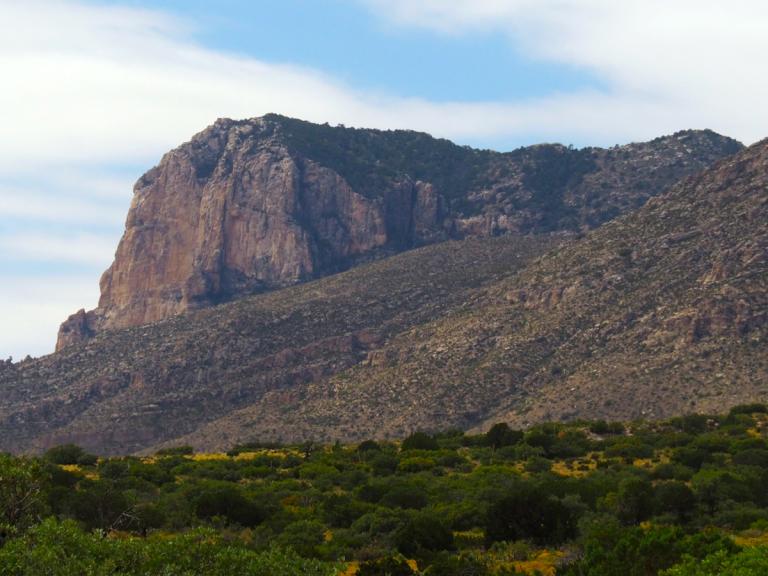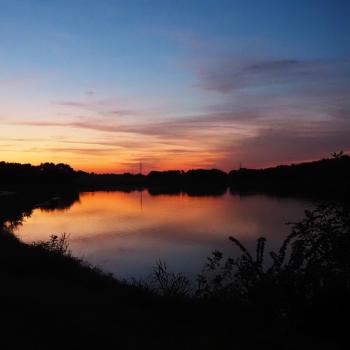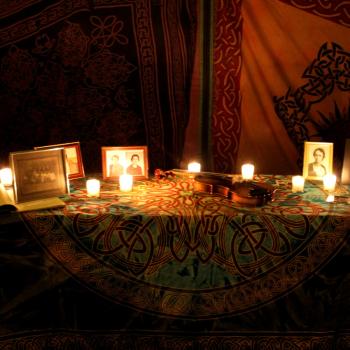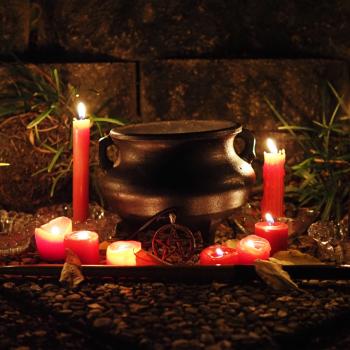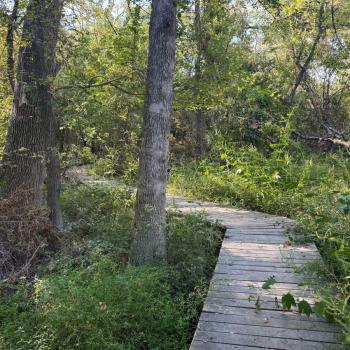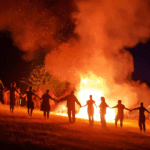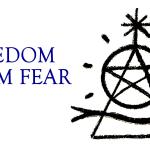In one traditional Wiccan initiation, the candidate is blocked at the edge of the circle and challenged at knife-point:
O thou who standeth on the threshold between the pleasant world of men and the domains of the Dread Lords of the Outer Spaces, hast thou the courage to make the Assay? For I tell thee verily, it were better to rush on my weapon and perish miserably than to make the attempt with fear in thy heart.
Only a fool has no fear when a knife-point touches their skin, even if the knife is in the hands of someone they know and trust. Only a fool has no fear when stepping across the threshold between the world of the living and the world of the Gods and ancestors. And yet the challenge stands.
The real challenge is not to pretend you have nothing to fear.
The real challenge is to move forward in spite of your fears.
We have reason to fear
If there is one theme I’ve seen over and over again these past couple of weeks, it’s fear. And I understand why.
The same Supreme Court that reversed Roe v. Wade reversed the Chevron ruling, which helped insure that regulations – especially environmental regulations – are made and enforced by subject matter experts and not by judges. And then they said that Presidents have presumptive immunity for official acts, making it much more difficult to prosecute Donald Trump for his attempts to overturn the 2020 election, and opening the door for even greater misconduct in the future.
People are starting to become aware of Project 2025, a far-right attempt to take the country back to 1890, including a nationwide ban on abortion, removing all legal protections for LGBTQ people, denying the existence of trans people, and banning “pornography” – which they define so broadly it would include books on sexual health and “spicy romance” novels.
And then there was the Presidential debate. Trump lied for 90 minutes straight, while Biden looked old and weak. Can Biden still beat Trump? Should he step aside? Can Kamala Harris beat Trump? Can anyone else replace Biden without alienating Black voters, who were critical to Biden’s win in 2020? Despite his lies to the contrary, Trump lost decisively in 2020 and I think most of us were expecting him to lose by even more this year. Now that’s much less certain.
You would have to be a fool to look at these things and not be afraid – and we are not fools.
Fear is natural and necessary
Fear is an evolutionary adaptation that helps us stay alive. We have a natural fear of snakes and spiders (may be venomous), high places (falls can be deadly), and large wild animals (lions and tigers and bears can and will eat you). People who lose or ignore these fears are the ones we nominate for Darwin Awards – often posthumously.
Fear triggers the production of adrenaline, to prepare the body for “fight or flight” – another evolutionary adaptation. It’s a very old adaptation, one we share with all mammals and some other vertebrates. It works well when it helps us take immediate physical action. But it’s exhausting, and it’s harmful when it builds up over and over again.
The physical and emotional damages caused by living in constant fear are very real, but also out of scope for this blog post. The point I want to make here is that while fear is not irrational it’s often non-rational – we don’t think, we just react. And when we react without thinking – without deep, reflective thinking – we often act in ways that are less than helpful.
Or we simply don’t act. The third “F” after fight or flight is freeze. If a wild predator is stalking you, freezing can a helpful response. Mammalian eyes detect motion much better than they distinguish prey from the background. If you don’t move and you make no sound, they may decide you’re not really there and move on.
But the predators at hand are not wild animals, and freezing is not helpful in our current political environment.
Our current environment requires courage.
Courage: doing the right thing even though we’re afraid
You’re welcome to google a dictionary definition of “courage” if you like. My definition of courage in this context goes back to that knife-point challenge: not pretending you’re not afraid, but doing the right thing even though you are afraid.
“What’s the matter? You scared?”
That’s the taunt of countless teenage boys and more than a few teenage girls. And other people who should know better. They’re trying to get you to do something you don’t want to do – usually for very good reasons – for their own entertainment. As the good parents taught, if you don’t want to do it, you don’t have to do it.
Our current situation isn’t a thrill-seeking bully trying to peer-pressure us into some risky stunt. This is a very real risk to life, liberty, and justice. We can’t just walk away.
Well, maybe you can. But even though I’m an old, straight, white, cis man with a middle class job, I don’t have enough privilege to ignore this. If the worst happens it will impact me, and it will impact my more vulnerable friends even more. So I can’t ignore it.
The first step of courage is recognize the situation for what it is, and understand that we are right to be afraid.
Doing what we can instead of obsessing over what we can’t
The second step is to decide what you’re going to do. In the initiation, that’s simple: you give the passwords, step into the circle, and continue with the ritual.
Here, it’s anything but simple – in large part because the outcome is out of our personal control. We can vote for President – and we damn well better – but we cannot appoint the President. The Supreme Court is dominated by conservatives (as are most lower courts) and will be for years to come. Gerrymandering dilutes votes, especially in state legislatures (the majority of governmental evil is coming from the states, not from Washington).
I’ve seen numerous people screaming “add more Justices” “get rid of the Electoral College” “distribute Senators proportionally” and “ranked choice voting!” All of those things are good ideas and we should be working toward them, but none of them are going to happen any time soon.
So we do what we can do now.
I’m voting for Joe Biden for President. If he decides to step aside (I don’t think that’s going to happen, but if it does) I’ll vote for Kamala Harris, or whoever the Democrats end up nominating. Biden isn’t a savior (as I reminded everyone in 2020) but he’s light years better than Trump.
Voting for a third party is the same as not voting. It accomplishes nothing and makes it that much more likely Trump will win.
I’m voting for Democrats in every race. Colin Allred has a decent chance to finally unseat Ted Cruz. Most of the other races in Texas are lost causes, but I’ll vote blue anyway. If you live in a place where a progressive independent or third party has a chance win, vote for them.
I’m supporting Biden and Allred financially. My contributions aren’t enough to get me a phone call from the candidates, but it’s something.
I’m encouraging my friends and neighbors to do the same.
That’s all I can do, so it’s what I will do.
The courage of experience
Divination can show us what is likely to happen, and that can be helpful.
But divination has limits.
My divination for this situation says things will not be catastrophic but neither will they be easy. My objective analysis says the same thing. Is one influencing the other? Perhaps. In any case, divining for matters with so many possibilities and so many inputs (154 million people voted in the 2020 Presidential election) is extremely difficult. And in any case, what does “not catastrophic but not easy” mean for the Presidential race?
Knowing what is coming helps us prepare for it – mentally and spiritually as well as tangibly. It gives us confidence that we’re going to be OK.
But what do we do when we can’t know what’s coming with certainty?
Then we can have confidence in ourselves that we can handle whatever comes our way.
This is one of the advantages of getting older. It’s not that I’ve seen it all so I know exactly what’s coming. It’s that I’ve experienced bad times before – both personally and in the wider world. I handled all those. So I’m confident that whatever happen in the near future, I can handle that too.
That doesn’t mean things will be easy or nice. One time “handling it” meant working 60 hours a week for six months straight, with some weeks going over 80 hours. Three times it meant making cross country moves, two of which I very much didn’t want to make. It’s going to mean making one more cross country move in a few years.
Yes, I have skills that some do not. You likely have skills I do not. What worked for me may not work for you, and vice versa. The point is that humans are resilient creatures. We are the children of those who adapted and therefore survived.
And we will survive whatever 2025 and beyond puts in front of us.
Don’t try to do this alone
I said this in the post on Tower Time and I’ll say it again: don’t try to get through this alone. Lean on your Gods, ancestors, and other spiritual allies. Lean on your friends and neighbors, and support them in their challenges and difficulties.
Humans are not solitary creatures – we are social animals. Our closest genetic relatives – chimpanzees and bonobos – live in groups ranging from a dozen or two up to about 150. And so have humans for most of our existence. Our contemporary society makes forming and maintaining these groups difficult, but it can be done.
This will become even more important in the future. We cannot survive and succeed alone and we cannot count on government to help. We have to help each other.
Starting now.
Hast thou the courage?
Fear is natural and necessary – it helps keep us alive. But our current situation is not one where the evolutionary instincts for fight, flight, or freeze are helpful responses. We need to respond to our fears with courage – to do what is necessary in spite of our fears, for ourselves and for the wider world.
Hast thou the courage?
I think we do.


